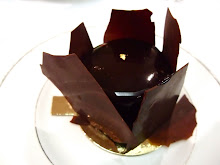With apologies to Proust...
Just back from a hectic road trip to France, the last of my summer travels! Managed to squeeze in four cities, plus a fantastic 'wine & food' walk through the picturesque vineyards of Beaujolais before returning to London. The Aubois city of Troyes was a revelation - full of ecclesiastical history, and the site of the violent Champagne riots of 1911 which nearly brought civil war to France. Troyes is also the capital of stained glass, and its cathedral has some magnificent examples of bright, colourful stained glass windows. On a less serious note, if you like shoes and colourful tennis apparel you might be interested to know that Troyes is also the home of Lacoste.
While we were there, we stayed at the excellent Maison de Rhodes - a beautiful, understated hotel, rated by The Observer as one of the '20 best hotels in France' no less. It was once the Bishop of Troyes' mansion, a convent, and even the home to the Knights Templar, and recently converted to a delightful hotel with 11 rooms, each with their own individual character and decor - a happy blend of old and new. I would've stayed there a week if our schedule permitted it, and definitely recommend if you're ever in Troyes then have a look at www.maisonderhodes.com and book this hotel as a special treat...
Just before leaving England I grabbed Don & Petie Kladstrup's 'Champagne: How the world's most glamorous wine trimphed over war and hard times', a wonderful book for wine enthusiasts and history buffs alike, compelling in its narrative of how this region transcended centuries of wars and invasions, and how la champagne - the drink - has defined the region in ways not immediately apparent when sipping this effervescent wine. The book is really worth reading, and if you're interested in wine history generally, the Kladstrups also wrote 'Wine & War' another excellent read...
Anyway, reading about le Champagne - the region - during our long car journey to Burgundy made the whole experience so much more interesting. Acres of champenois farmland bear a striking resemblance to the American midwest, gently rolling fields as far as the eye can see - a rather disconcerting sight to someone who grew up surrounded by mountains and fjords! Yet despite the benign landscape there's an eeriness to places such as the Somme and Marne, where millions of lives were lost in the first world war, and every small town and the sleepiest of villages in the area have prominent memorials to remember the 'Great War', a visible reminder that France suffered more from the first of the 20th century wars than the second.
The trick with pain perdu, as learnt from the wonderful Cook's Illustrated website, is to preheat your oven and place each toast in after frying to keep it warm, also adding flour to the batter will create a crisp exterior to the bread. This recipe, although inspired by time spent in France, is unashamedly North American in that I pour maple syrup on the finished pain perdu, something that always reminds me of my Mother as she made this for my birthdays when growing up, but use whichever toppings/syrups you prefer, even if it's a sacrilege to the French ;-)
Serves 4
- 8 slices stale white bread, you can also use challah, cinnamon bread or brioche
- 2 large eggs
- 250 ml milk
- 2 tbsp melted butter
- 100g plain flour
- 2 tbsp caster sugar
- 1/4 tsp salt
- 1 tsp cinnamon
- 2 tsp vanilla
- extra butter/oil for frying
- summer fruit for topping
- maple syrup and some fromage frais too
Preheat oven to 100ºC, place the 8 slices on a wire rack and allow to dry out 10-15 minutes in the oven
Meanwhile make your batter: mix all your wet ingredients in a medium bowl and whisk until smooth, then add your flour in increments, whisking continuously until a smooth batter forms.
Take 2 slices of bread and soak these in the batter for 20-30 seconds on each side, then heat your butter or oil in a large, non-stick frying pan over medium heat until the butter foams and place the battered bread in, ensuring that any excess batter drips back into the bowl, rather than in the frying pan!
Fry each side of bread for 2- 2 1/2 minutes, and then place the fried bread back on the wire rack in the oven. Keep warm while repeating the process with the remaining 6 slices. Serve warm with a dollop of fromage frais, some berries sprinkled over and a LOT of maple syrup..
* alternative suggestions for toppings*
- peaches, passionfruit, or try caramelised apples or pears - any fruit which is seasonal and has some acidity to cut through all the richness of the pain perdu
- sauces such as raspberry coulis, chocolate or butterscotch sauce, vanilla-infused acacia honey (see my previous post) or something floral like violet syrup.
- Ice cream also goes extremely well, but then it becomes dessert, not breakfast!


































No comments:
Post a Comment